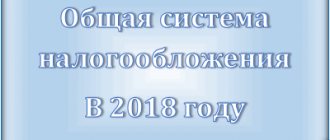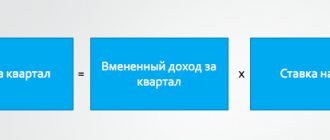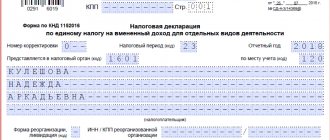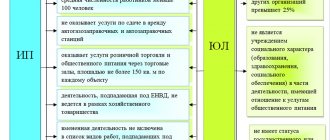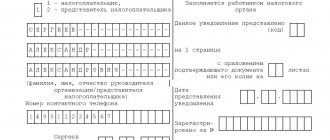How to become a payer of the simplified tax system
A company or individual entrepreneur can become a “simplified” if it meets the following requirements (Article 346.12 of the Tax Code of the Russian Federation):
- The amount of income for the 9-month period of the year preceding the year in which the simplified tax system began to be applied is less than 112.5 million rubles. (criterion for organizations only). For example, if the transition is planned from 2021, the company’s income from January to September 2021 cannot exceed the specified amount.
NOTE! This income limitation is provided only for organizations. Individual entrepreneurs can switch to the simplified tax system for any amount of income, but in the future they must comply with the revenue limit of 150 million rubles. in a year.
- The average number of employees is no more than 100.
- The residual value of fixed assets is no more than 150 million rubles.
NOTE! This requirement applies to both companies and individual entrepreneurs.
- The percentage of participation in the organization of another taxpayer-legal entity is less than 25%.
- The payer category is not reflected in subparagraph. 1–13 p. 3 art. 346.12 Tax Code of the Russian Federation.
According to the requirements of Art. 346.13 of the Tax Code of the Russian Federation, in order to switch to the simplified tax system, an application should be sent to the tax authority with which the company or individual entrepreneur is registered:
- before December 31 of the year preceding the transfer, or
- within 30 calendar days - for newly registered payers.
For more information on how to become a payer on the simplified tax system, see the material “Who are the payers of the simplified tax system?” .
Where to pay tax under the simplified tax system if an individual entrepreneur does not work at his place of registration, find out here.
How to become a UTII payer
IMPORTANT! UTII cannot be used from 2021. It has been canceled throughout the Russian Federation. A number of regions abandoned the special regime already in 2020. See here for details.
The procedure for transition to imputation is specified in Art. 346.28 of the Tax Code of the Russian Federation and provides for:
- registration at the place of activity (or registration) of the company or individual entrepreneur;
- submitting a notice of transition to UTII no later than 5 days from the date of commencement of UTII application.
ConsultantPlus experts explained whether it is possible to switch to UTII in mid-2021 and answered the most common questions from taxpayers:
If you don't have access to the system, get a free trial online.
UTII payers can provide the following types of services:
- of a domestic nature;
- veterinary;
- repair and maintenance of cars and motorcycles;
- on the organization of parking lots;
- catering (the area of the premises should not exceed 150 sq. m);
- retail sale of food and non-food products (maximum area limitation - 150 sq. m);
- for transportation by road;
- outdoor advertising on special structures or on vehicles;
- leasing buildings and land plots for retail chains;
- for the placement and residence of people in an area of no more than 500 square meters. m.
Read more about the procedure for registering as a UTII payer here.
Restoration of VAT taken into account in the OSN
If the company received advances from customers on whom VAT was charged, then in the event of a transition to UTII, this VAT must be deducted. This should be done if no shipment was made against this advance (work performed, services provided).
VAT deductibility is subject to restoration if the purchased assets have not yet been used or sold at the date of transition. For non-depreciable assets, VAT should be restored in full, and for depreciable assets - in accordance with the residual value. The restoration procedure is carried out in the tax period that precedes the transition to UTII. Recovered VAT is taken into account in the tax base when calculating income tax as an expense.
How to switch from simplified tax system to UTII
The transition from simplified tax system to UTII (here we are talking about replacing one mode with another, without combining, which we will talk about below) is carried out in the following ways:
- At the end of the year in which the taxpayer lawfully applied the simplified tax system. To do this, you must meet 2 deadlines. Before January 15 of the year following the year of application of the simplified tax system, the Federal Tax Service must be notified of the refusal to use this system. What happens if such notice is not submitted, see here. At the same time, no later than 5 working days from the date of commencement of application of UTII, you must inform the Federal Tax Service about this circumstance (see forms for individual entrepreneurs and for organizations). Accordingly, if you intend to apply UTII instead of the simplified tax system from the beginning of the year, you must submit both applications in compliance with both established deadlines. Such a transition cannot be made during the year, since there is an obligation to apply the simplified tax system throughout the entire tax period, unless the right to use this regime is lost.
- In case of loss of the right to use the simplified tax system during the year due to non-compliance with the requirements of Art. 346.12 of the Tax Code of the Russian Federation (these include both termination of compliance with the above requirements and exceeding the maximum allowable limit of possible income for the simplified tax system of 150 million rubles), the payer must stop charging tax under this system from the beginning of the quarter in which this occurred. The Federal Tax Service must be notified of this fact within 15 days following the quarter of loss. From the quarter of loss until the end of the year, taxes should be calculated in the manner in force for OSNO, since the Tax Code of the Russian Federation does not provide for the possibility of replacing the simplified tax with UTII before the end of the year in the event of loss of the right to the simplified tax system. If you intend and have the opportunity to apply UTII at the end of the year in which the right to the simplified tax system was lost, you must report this to the Federal Tax Service within 5 working days from January 1 of the year following the year of loss.
The form of notification of refusal to use the simplified tax system is contained in the order of the Federal Tax Service of Russia dated November 2, 2012 No. ММВ-7-3/ [email protected]
It should also be noted that, by virtue of the norms of paragraph 7 of Art. 346.13 of the Tax Code of the Russian Federation, in the event of a transition to UTII from the simplified tax system back to the simplified tax system, the taxpayer can only transfer one year after the transition from the simplified tax system.
Registration with the tax authority
When a company has decided to switch to UTII and has chosen a date, the next thing that needs to be done is to notify the tax authority of its desire. This must be done within 5 working days from the date of switching to work on UTII. The tax office will need to fill out a transfer application:
- UTII-1 – filled out by organizations;
- UTII-2 - fill out the IP.
The application is submitted by:
- location of the company (registration of individual entrepreneurs), if a specific address for activity is not determined (for peddling, distribution trade, road transportation);
- place of activity.
If there are many addresses and they belong to the same municipality, then the application can be submitted to one of any addresses. When all addresses belong to different municipalities, the application should be submitted to each of them.
Is it possible to combine simplified taxation system and UTII?
The Tax Code of the Russian Federation does not contain a ban on the simultaneous use of both regimes; Moreover, if the taxpayer calculates UTII for some types of activity, then the simplified tax system applies to all other types of activity (that is, there is no need to formalize withdrawal from simplified taxation). However, when combining these 2 modes, an individual entrepreneur or company must maintain separate records.
For more information about separate accounting, see the material “Separate accounting under the simplified tax system and UTII: maintenance procedure” .
About the nuances of these tax regimes, see the material “UTII or simplified tax system: which is better - imputation or simplified taxation?” .
Features of the transition from simplified to imputation
Due to some differences in accounting for income and expenses in a simplified manner, there are a number of features that you should definitely pay attention to when switching to UTII.
Let's consider several situations that taxpayers may encounter:
Situation 1
The taxpayer, using the simplified tax system, sold products for which payment was received while on UTII. What to pay - tax according to UTII or according to the simplified tax system?
There is no need to pay a simplified tax; you only need to pay UTII for the period of sale.
See also: “How to take into account for the simplified tax system goods purchased in the “imputed” period?”
Situation 2
The taxpayer received an advance payment during the period of being on the simplified tax system, and the implementation was reflected in the period of application of UTII. What should I pay - imputed or simplified tax?
You must pay tax according to the simplified tax system for the period in which the funds were received.
Situation 3
A taxpayer using the simplified tax system, not being a VAT payer, as a general rule usually does not use accounts 19 “Input VAT” and 68.2 “Accrued VAT” in accounting. Do I need to pay VAT when switching to imputation?
A taxpayer using UTII also does not have to pay VAT. There will be 2 situations as exceptions for both him and the simplified tax system payer:
- He is a tax agent for VAT.
- He issued a VAT invoice.
In both cases, non-payers of this tax must pay it to the budget. Therefore, when applying both the simplified tax system and UTII, the tax that needs to be paid will appear in account 68.2. In this case, account 19 will not be used, since tax evaders do not have the right to deduction.
For more information about the peculiarities of the work of VAT payers and non-payers, see the material “Basic rules when an organization without VAT works with an organization with VAT” .
Transition period: income tax
The Tax Code of the Russian Federation does not establish the procedure for forming the tax base for the transition period when an organization transitions from the general taxation system to UTII. Therefore, when calculating income tax, recognize income and expenses according to the general rules that are prescribed in Chapter 25 of the Tax Code of the Russian Federation. They will not affect the calculation of UTII.
Situation: how to take into account income and expenses for operations that began during the period of application of the general taxation system, and ended after the transition to UTII? Before the transition, the organization calculated income tax using the accrual method.
When calculating taxable profit, include only those incomes and expenses that arose (were accrued) before the transition to UTII.
The payment period does not matter (except for the expenses listed in clause 6 and subclause 4 of clause 7 of Article 272 of the Tax Code of the Russian Federation). This is stated in paragraph 1 of Article 271 and paragraph 1 of Article 272 of the Tax Code of the Russian Federation. In addition, some types of expenses can be taken into account when calculating income tax only if additional requirements are met. For example, expenses for the purchase of raw materials and materials can be written off only after they are released into production and used in it at the end of the month (clause 2 of Article 272, clause 5 of Article 254 of the Tax Code of the Russian Federation). Advances received and issued on account of the upcoming delivery of goods (works, services) should not be included in the income tax base either before or after the transition to UTII (clause 1 of Article 271, clause 1 of Article 272, subclause 1 clause 1 article 251 of the Tax Code of the Russian Federation).
The dates of recognition of certain types of income and expenses are shown in the table.
Situation: how to take into account income and expenses for operations that began during the period of application of the general taxation system, and ended after the transition to UTII? Before the transition, the organization calculated income tax using the cash method.
When calculating taxable profit, include only those incomes and expenses that arose (were accrued) and paid before the transition to UTII.
When using the cash method, income and expenses must be recognized in the period in which they are paid. This procedure is provided for in Article 273 of the Tax Code of the Russian Federation.
Payment means:
- when recognizing income - the day the debt to the organization is repaid (the day money is received in a bank account or cash register, receipt of property, etc.). Therefore, advances received for the upcoming supply of goods (work, services) before the transition to UTII must be included in income when calculating income tax (subclause 1, clause 1, article 251 of the Tax Code of the Russian Federation, clause 8 of the information letter of the Presidium of the Supreme Arbitration Court of the Russian Federation dated December 22, 2005 No. 98);
- when recognizing expenses - the day of termination of the organization's obligations (the day of payment of money from the cash register or transfer from a bank account, disposal of property, etc.). However, some types of expenses reduce taxable income only if additional requirements are met. For example, expenses for the purchase of raw materials and materials can be written off only as they are released into production (subclause 1, clause 3, article 273 of the Tax Code of the Russian Federation).
Advances transferred to suppliers who did not fulfill their obligations before the organization switched to UTII should not be included in expenses. Even when using the cash method to recognize costs, in addition to their payment, a counter termination of obligations (supply of goods, performance of work, provision of services) is necessary (clause 3 of Article 273 of the Tax Code of the Russian Federation). Until this condition is met, the amount of preliminary payments cannot be included in expenses. Representatives of the tax service take the same position (see, for example, letter of the Department of Tax Administration of Russia for Moscow dated December 15, 2003 No. 23-10/4/69784).
When switching to UTII in the middle of the year, submit an income tax return for the reporting period during which the organization applied the general taxation system. For example, when switching to UTII in August 2013, submit a declaration for 9 months of 2013, reflecting income and expenses for the period from the beginning of the year to the date of transition to UTII. This conclusion follows from the letter of the Federal Tax Service of Russia dated August 1, 2012 No. ED-4-3/12801.
The procedure for filling out reports on the simplified tax system and UTII
If a taxpayer, having decided to switch to UTII for certain types of activities, applies the simplified tax system and UTII in parallel, he will have to fill out the appropriate declaration for each type of activity and pay taxes to the budget.
The form of declaration under the simplified tax system is established by order of the Federal Tax Service of Russia dated February 26, 2016 No. ММВ-7-3/ [email protected] ; At the same time, you should pay attention to the fact that for the objects “income” and “income minus expenses” the procedure for filling out the declaration is slightly different.
In accordance with Art. 346.23 of the Tax Code of the Russian Federation, organizations send reports to the tax authority according to the simplified tax system until March 31 after the end of the year, individual entrepreneurs - before April 30. However, in certain situations, the simplified tax system declaration should be submitted earlier: before the 25th day of the month following the one in which the activity on the simplified tax system was terminated at the initiative of the taxpayer, and before the 25th day of the month following the quarter of termination due to loss of the right to be in the specified regime .
Advance payments are due by the 25th day of the month of the next quarter. Payment of the simplified tax at the end of the year is made within the reporting deadlines.
This material will help you fill out the simplified tax return correctly.
Now about what concerns reporting on UTII. Currently, the declaration form is in force, approved by order of the Federal Tax Service dated June 26, 2018 No. ММВ-7-3/ [email protected]
For a sample of filling out a declaration using the new form, see here.
The deadline for submitting the declaration is regulated by clause 3 of Art. 346.32 of the Tax Code of the Russian Federation - no later than the 20th day of the month following the expired quarter.
Payment of UTII, according to clause 1 of Art. 346.32 of the Tax Code of the Russian Federation, is carried out before the 25th day of the month following the expired quarter.
Stage 1 – Determine whether it is possible to work on UTII
Not all taxpayers can apply the imputed regime. There are certain restrictions established by clause 2.2 of Article 346.26 of the Tax Code of the Russian Federation.
The imputed mode is available if the following conditions are simultaneously met:
- Last year the average number of workers equaled or exceeded 100;
- The share in equity capital equals or exceeds 75% (relevant only for legal entities forming the authorized capital);
- Local regulatory legislative acts establish the possibility of working on UTII for the type of business for which the transition is planned (the Tax Code of the Russian Federation determines a list of types of activities for UTII, however, each MO can edit it, determining the exact list from this list for which work on “imputation” is allowed territory of this municipality, so this point needs to be clarified in relation to a specific area).
If the above three points are met, then you can switch to UTII. If at least one of them is violated, you cannot work on the imputation.
An enterprise in basic mode needs to take the following actions at the initial stage:
- Find out if the city or district has a regulatory document on UTII, which specifies the types of activities; this may be a law or a decision of local authorities;
- Check whether the type of business being transferred to imputation is included in this law;
- Calculate the average number of employees in the last calendar year and ensure compliance with the conditions for restrictions for employers;
- Make sure that your own share in the management company makes up a large part of its total value (from 75%).
It is important that the activity transferred to UTII is not carried out under a simple partnership or trust management agreement.
Results
When switching from the simplified tax system to UTII, the taxpayer must promptly notify the tax authority about this in order to avoid unpleasant consequences. Despite the fact that the simplified tax system and UTII are similar in some aspects, for a correct transition from one special regime to another, it is necessary to correctly distinguish between the periods of application of the simplified tax system and UTII.
And don’t forget that 2021 is the last year when you can work on UTII. And not everyone. We talked about the abolition of imputation here.
Sources:
- Tax Code of the Russian Federation
- Order of the Federal Tax Service of Russia dated November 2, 2012 No. ММВ-7-3/ [email protected]
- Order of the Federal Tax Service of Russia dated June 26, 2018 No. ММВ-7-3/ [email protected]
You can find more complete information on the topic in ConsultantPlus. Free trial access to the system for 2 days.
Reinstatement of input VAT
When changing the main system to imputation, you are required to restore the amount of input VAT accepted for deduction. Input VAT on unused and unsold materials, goods, services and work is restored until the system is changed. Restore VAT in full. VAT on fixed assets and intangible assets is also subject to restoration. The amount of restored VAT, which will increase the item of other expenses, will be proportional to the residual value of the assets.
The cloud service Kontur.Accounting is suitable for both UTII and OSNO calculations. Prepare, pay and report taxes online. The service will simplify the calculation of salaries, payment of taxes and submission of reports. For the first 14 days, all new users work in the program for free.

